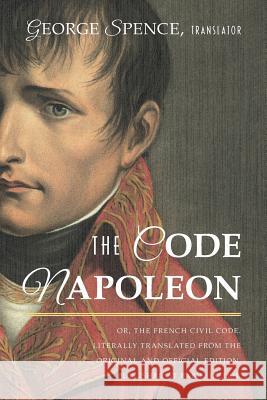The Code Napoleon; Or, the French Civil Code. Literally Translated from the Original and Official Edition, Published at Paris, in 1804, by a Barrister » książka
The Code Napoleon; Or, the French Civil Code. Literally Translated from the Original and Official Edition, Published at Paris, in 1804, by a Barrister
ISBN-13: 9781616195052 / Angielski / Miękka / 2015 / 652 str.
The Code Napoleon; Or, the French Civil Code. Literally Translated from the Original and Official Edition, Published at Paris, in 1804, by a Barrister
ISBN-13: 9781616195052 / Angielski / Miękka / 2015 / 652 str.
(netto: 195,00 VAT: 5%)
Najniższa cena z 30 dni: 201,96
ok. 16-18 dni roboczych.
Darmowa dostawa!
Early English translation of the Code Napoleon. xix, 627 pp. Originally published: London: Printed for Charles Hunter, Law Bookseller, 1824. Reprint of the second English edition. A comprehensive reformation and codification of the French civil laws, the Code Napoleon was renamed the Civil Code after the Bourbon restoration, and is still in force. It has served as the model for the legal codes of more than twenty nations throughout the world. The French Revolution overturned many of the hundreds of codes of law that had prevailed from ancient times, and added more than 14,000 pieces of legislation. After the National Convention and Directory failed in five attempts to organize this unwieldy mass, Napoleon appointed a commission to draft the new Civil Code. It was enacted in March 21, 1804, after a three year period of 87 sessions. It embodies a typically Napoleonic mix of liberalism and conservatism. Most of the freedoms won by the revolution, such as equality before the law, freedom of religion and the abolition of feudalism were preserved. At the same time, the Code reinforced patriarchal power by making the husband the ruler of the household.
The translator, GEORGE SPENCE 1787-1850], was an English jurist and Barrister of the Inner Temple.Early English translation of the Code Napoleon. xix, 627 pp. Originally published: London: Printed for Charles Hunter, Law Bookseller, 1824. Reprint of the second English edition. A comprehensive reformation and codification of the French civil laws, the Code Napoleon was renamed the Civil Code after the Bourbon restoration, and is still in force. It has served as the model for the legal codes of more than twenty nations throughout the world. The French Revolution overturned many of the hundreds of codes of law that had prevailed from ancient times, and added more than 14,000 pieces of legislation. After the National Convention and Directory failed in five attempts to organize this unwieldy mass, Napoleon appointed a commission to draft the new Civil Code. It was enacted in March 21, 1804, after a three year period of 87 sessions. It embodies a typically Napoleonic mix of liberalism and conservatism. Most of the freedoms won by the revolution, such as equality before the law, freedom of religion and the abolition of feudalism were preserved. At the same time, the Code reinforced patriarchal power by making the husband the ruler of the household.
The translator, GEORGE SPENCE [1787-1850], was an English jurist and Barrister of the Inner Temple.











